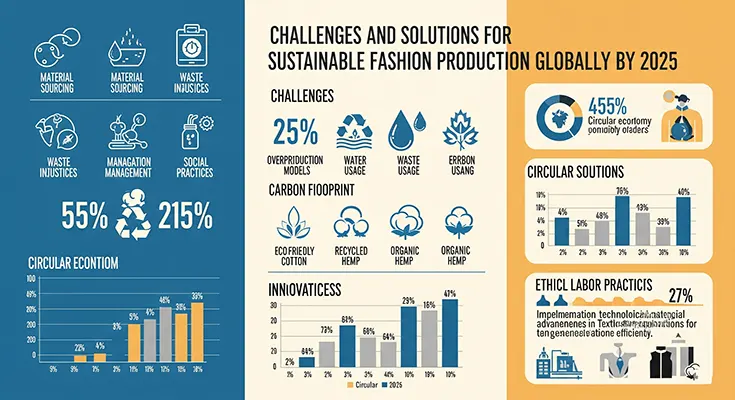The fashion industry is at a crossroads, facing mounting pressure to address its environmental impact and embrace sustainability. As the global demand for ethical and eco-friendly fashion continues to soar, fashion production must undergo a substantial transformation to meet these evolving consumer expectations. This article examines the challenges faced by the fashion industry in achieving sustainable production by 2025 and proposes actionable solutions to drive lasting change.
Challenge 1: Environmental Impact of Textile Production
The textile production process is a major contributor to environmental degradation, with concerns surrounding water consumption, chemical pollution, and carbon emissions. Traditional manufacturing methods have a significant carbon footprint, leading to deforestation, water pollution, and greenhouse gas emissions. This places immense strain on ecosystems, exacerbating climate change and threatening biodiversity.
Solution: Adoption of Sustainable Materials and Processes
Fashion brands must prioritize the adoption of sustainable materials such as organic cotton, hemp, recycled polyester, and innovative bio-based fabrics. Embracing eco-friendly dyeing and finishing techniques, along with water recycling initiatives, is crucial to mitigate the environmental impact of textile production. By investing in sustainable manufacturing technologies and transitioning to renewable energy sources, fashion production can significantly reduce its carbon footprint while preserving vital ecosystems.
Challenge 2: Supply Chain Transparency and Ethical Labor Practices
The fashion industry’s global supply chains often involve complex networks of manufacturers, subcontractors, and suppliers, making it challenging to ensure transparency and uphold ethical labor standards. Exploitative labor practices, unsafe working conditions, and inadequate wages are pervasive issues within garment factories, particularly in regions with lax labor regulations.
Solution: Implementation of Ethical Sourcing and Supply Chain Traceability
To address these challenges, fashion brands must prioritize supply chain transparency and ethical sourcing practices. By implementing robust auditing and certification systems, brands can verify the ethical treatment of workers and ensure compliance with labor rights. Embracing technology such as blockchain and RFID tagging enables end-to-end traceability, empowering consumers to make informed purchasing decisions while holding brands accountable for their supply chain practices.
Challenge 3: Waste Management and Circular Economy Adoption
The fashion industry generates a staggering amount of waste, with textile waste accounting for a significant portion of landfill contributions globally. The linear nature of fashion production, characterized by “take-make-dispose” consumption patterns, perpetuates the environmental impact of textile waste and resource depletion.
Solution: Embrace Circular Design and Closed-Loop Systems
To combat textile waste, fashion production must transition towards a circular economy model. Designing with longevity in mind, embracing modular and repairable designs, and prioritizing recyclable and biodegradable materials are crucial steps towards minimizing waste generation. Additionally, brands can incorporate take-back programs, upcycling initiatives, and garment recycling facilities to extend the lifespan of products and divert textile waste from landfills.
Challenge 4: Consumer Awareness and Behavior Change
Shifting consumer attitudes and behaviors towards sustainable fashion consumption presents a formidable challenge, as entrenched fast fashion norms and a lack of awareness often hinder widespread adoption of eco-friendly purchasing habits.
Solution: Education, Advocacy, and Transparency
Fashion brands must prioritize consumer education, advocating for the benefits of sustainable fashion and the implications of fast fashion consumption. By fostering transparent communication about the environmental and social impact of their products, brands can empower consumers to make informed choices aligned with their values. Collaborating with influencers and industry leaders to promote sustainable fashion initiatives and disseminate educational content can drive meaningful behavior change and shape a more conscientious consumer culture.
Achieving sustainable fashion production globally by 2025 demands a collective effort to tackle the multifaceted challenges facing the industry. By embracing sustainable materials and processes, prioritizing supply chain transparency, adopting circular economy principles, and advocating for consumer awareness, the fashion sector can pave the way for a more ethical and environmentally conscious future. As we approach 2025, the imperative for sustainable fashion production has never been more urgent, and by addressing these challenges head-on, the industry can set a new standard for responsible and impactful fashion production on a global scale.





